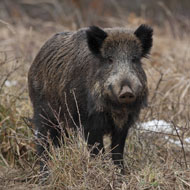EU experts look at measures to prevent ASF

There were calls to harmonise the way in which wild boar data is collected across the EU.
Food safety experts say intensive hunting of wild boar and avoiding feeding should be implemented to reduce the risk of African swine fever (ASF).
The European Food Safety Authority (Efsa) made the recommendations in a scientific opinion published this week.
Wild boar are known to play an important role in the spread of ASF. Defra’s latest update shows the disease is continuing to be reported wild boar, domestic pigs and farmed wild boar in Eastern Europe and western Eurasia.
When an epidemic is ongoing, Efsa recommended avoiding activities that may increase the movement of wild boar, such as intensive drive hunts. Regular dialogue between stakeholders is also important for increasing preparedness, the opinion states.
Christian Gortazar, chair of EFSA’s working group on ASF, said: “Experts agreed that building awareness in society and providing incentives to people who report on wild boar carcasses are essential to fight the disease.”
Reporting of dead wild boar is currently the best way to detect new ASF cases at an early stage, in previously disease-free areas.
Experts could not determine the threshold for wild boar, below which ASF would not take hold, as the disease has spread in areas where the prevalence of wild boar is low.
There were calls to harmonise the way in which wild boar data is collected across the EU, to make it more comparable. Efsa is funding a project called ENETWILD to help collect and harmonise data on the geographical distribution and abundance of wild boar across Europe.



 RCVS Knowledge has welcomed Professor Peter Cockcroft as editor-in-chief for Veterinary Evidence.
RCVS Knowledge has welcomed Professor Peter Cockcroft as editor-in-chief for Veterinary Evidence.